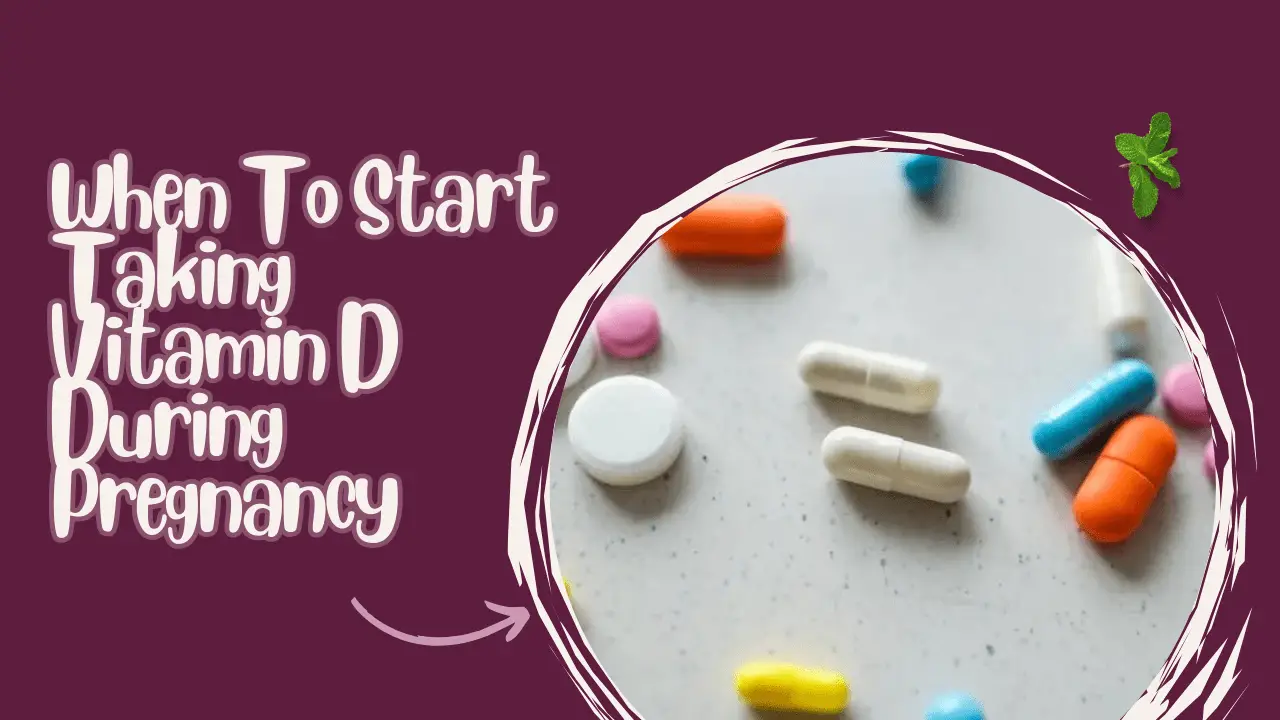Vitamin D is a crucial nutrient that plays a significant role in maintaining overall health, particularly during pregnancy. This essential vitamin is vital for the proper development of the fetus, supporting bone health and the immune system.
As the body undergoes various changes throughout pregnancy, adequate levels of vitamin D become even more critical to ensure the well-being of both the mother and the developing baby. Research has shown that insufficient vitamin D during pregnancy can lead to various complications, including an increased risk of gestational diabetes and preeclampsia.
Therefore, understanding when to start taking vitamin D during pregnancy is essential for expectant mothers. In this blog post, we will explore the importance of vitamin D, its recommended intake, and the best sources to ensure optimal health for both mother and child.
Vitamin D:
Vitamin D is a fat-soluble vitamin that is crucial for various bodily functions, including the regulation of calcium and phosphorus, which are essential for maintaining healthy bones. It exists in two primary forms: Vitamin D2 (ergocalciferol) and Vitamin D3 (cholecalciferol).
Vitamin D3 is the form that is produced in the skin when exposed to sunlight and is also found in animal-based foods. In contrast, Vitamin D2 is primarily obtained from plant sources and fortified foods.

During pregnancy, maintaining adequate levels of vitamin D is particularly important. Research indicates that vitamin D plays a vital role in fetal development, influencing bone mineralization and supporting the immune system. Additionally, sufficient levels of this vitamin can help prevent complications such as gestational diabetes, preeclampsia, and low birth weight.
Pregnant women are often advised to monitor their vitamin D intake and may require supplementation, especially if they have limited sun exposure or dietary restrictions.
A healthcare provider can determine the appropriate dosage to ensure optimal health for both mother and baby. Understanding the importance of vitamin D during pregnancy is essential for making informed decisions about nutrition and supplementation, ultimately contributing to a healthier pregnancy outcome.
Why Is Vitamin D Important During Pregnancy?
Vitamin D is critical for the health and well-being of both the mother and the developing fetus during pregnancy. Its importance cannot be overstated, as it plays several key roles that significantly impact maternal and fetal health.
-
Fetal Development:
One of the primary reasons vitamin D is essential during pregnancy is its role in fetal development. This vitamin is crucial for the proper formation of the baby’s bones and teeth, as it helps regulate calcium and phosphorus levels in the body. Insufficient vitamin D during pregnancy can lead to issues such as rickets in the newborn, characterized by weak or soft bones. Adequate levels of this vitamin also support the development of the fetal immune system, which is vital for the baby’s ability to fight infections after birth.
-
Maternal Health:
Vitamin D is equally important for the mother’s health. It helps reduce the risk of gestational diabetes, a condition that can lead to complications for both mother and baby if left unmanaged. Studies have shown that pregnant women with adequate vitamin D levels have a lower risk of preeclampsia, a condition characterized by high blood pressure and potential organ damage that can occur during pregnancy. Additionally, maintaining optimal vitamin D levels can help prevent postpartum depression, which affects many new mothers.
-
Immune System Support:
Vitamin D is known to play a role in modulating the immune system. During pregnancy, the body undergoes changes that can affect immune function. Adequate vitamin D levels can help enhance the immune response, potentially lowering the risk of infections, such as respiratory illnesses, which are more common during pregnancy.
-
Long-Term Benefits:
Research suggests that vitamin D during pregnancy may also have long-term benefits for the child. Children born to mothers with adequate vitamin D levels may have a reduced risk of developing conditions like asthma, allergies, and autoimmune diseases later in life. Thus, ensuring sufficient vitamin D intake during pregnancy is not just about immediate health; it can have lasting implications for the child’s health.
When to Start Taking Vitamin D During Pregnancy?
Determining the right time to start taking vitamin D during pregnancy is crucial for ensuring both maternal and fetal health. While the body can produce vitamin D from sunlight exposure, many women may not get enough from sun exposure alone, especially during winter months or if they have limited outdoor activity. Therefore, it’s essential to understand when supplementation should begin.
Preconception and Early Pregnancy:
Ideally, women should consider their vitamin D intake before conception. Research indicates that women who are trying to conceive should optimize their vitamin D levels in advance. This proactive approach ensures that their bodies are well-prepared to support a healthy pregnancy right from the start.
If a woman is planning to become pregnant, she can consult her healthcare provider for personalized recommendations regarding vitamin D supplementation.
First Trimester:
If a woman is not already taking vitamin D before conception, it is advisable to start as soon as she confirms her pregnancy. The first trimester is a critical time for fetal development, including the formation of bones and organs. During this stage, the demand for vitamin D increases, and supplementation may help prevent deficiencies that could impact the baby’s growth and health.
Assessing Individual Needs:
The timing of vitamin D supplementation can also depend on individual factors such as geographic location, skin tone, lifestyle, and dietary habits. For instance, women living in northern latitudes with limited sun exposure may need to start taking vitamin D earlier and at higher doses. Those with darker skin may also require more time in the sun to produce adequate levels of vitamin D.
Testing and Monitoring Levels:
Healthcare providers may recommend vitamin D testing, particularly if a woman has risk factors for deficiency, such as obesity, limited sun exposure, or a history of vitamin D deficiency. Testing can help determine whether supplementation is necessary and, if so, at what dosage. Regular monitoring of vitamin D levels throughout pregnancy ensures that mothers can adjust their intake as needed to maintain optimal health.
During the Second and Third Trimesters:
Continuing vitamin D supplementation throughout the pregnancy is generally recommended, as the body’s requirements increase during the second and third trimesters. The ongoing support from vitamin D is crucial for both the mother’s health and the baby’s growth and development.
In summary, the best time to start taking vitamin D during pregnancy is as early as possible—ideally, preconception and confirmed pregnancy. Pregnant women should consult their healthcare provider to establish a tailored supplementation plan based on their specific needs and circumstances, ensuring optimal health for both mother and baby throughout the pregnancy.
Sources of Vitamin D:
Vitamin D is essential for various bodily functions, especially during pregnancy, where it plays a pivotal role in the health of both the mother and the developing fetus. Understanding the sources of vitamin D is crucial for pregnant women to ensure they meet their nutritional needs. There are several primary sources of vitamin D, including sunlight, dietary sources, and supplements.

-
Sunlight Exposure:
One of the most natural and effective sources of vitamin D is sunlight. When the skin is exposed to ultraviolet B (UVB) rays from the sun, it synthesizes vitamin D3, which is then converted to its active form in the liver and kidneys.
-
Dietary Sources:
Incorporating vitamin D-rich foods into the diet is another effective way to boost intake.
- Fatty Fish: Salmon, mackerel, sardines, and tuna are among the best natural sources of vitamin D. These fish not only provide high levels of the vitamin but also offer omega-3 fatty acids, which are beneficial for fetal development.
- Fortified Foods: Many foods are fortified with vitamin D, including milk, orange juice, cereals, and plant-based milk alternatives (like almond or soy milk). Checking food labels can help pregnant women choose products that contain added vitamin D.
- Egg Yolks: Eggs are another source of vitamin D, with the yolk containing small amounts of the vitamin. Including eggs in the diet can contribute to overall intake.
- Mushrooms: Certain mushrooms, particularly those exposed to UV light, can provide vitamin D, making them a good option for vegetarian or vegan diets.
-
Supplements:
For many pregnant women, obtaining sufficient vitamin D through sunlight and diet alone can be challenging. In such cases, vitamin D supplements may be necessary. Healthcare providers often recommend prenatal vitamins that include vitamin D to help ensure adequate intake.
The recommended daily allowance (RDA) of vitamin D during pregnancy varies by country, but it generally ranges from 600 to 800 International Units (IU). It is crucial for pregnant women to consult their healthcare provider before starting any supplements to determine the appropriate dosage based on individual needs.
-
Importance of Balance:
While getting enough vitamin D is essential, it is equally important to avoid excessive intake, which can lead to toxicity. Regular monitoring and guidance from healthcare professionals can help pregnant women find the right balance in their vitamin D sources.
How to Monitor Vitamin D Levels:
Monitoring vitamin D levels during pregnancy is crucial for ensuring the health and well-being of both the mother and the developing fetus.
Adequate levels of vitamin D are associated with numerous health benefits, including improved bone health, enhanced immune function, and reduced risks of complications such as gestational diabetes and preeclampsia. Here are several effective methods for monitoring vitamin D levels throughout pregnancy.

-
Blood Tests:
The most reliable way to assess vitamin D levels is through a blood test that measures the concentration of 25-hydroxyvitamin D (25(OH)D) in the bloodstream. This form of vitamin D is the primary indicator of a person’s vitamin D status. Pregnant women should consult their healthcare provider about having this test performed, especially if they have risk factors for deficiency, such as limited sun exposure, darker skin tones, or dietary restrictions. Blood tests can provide valuable information about whether a woman’s vitamin D levels are adequate, insufficient, or deficient.
-
Timing of Testing:
The timing of vitamin D testing can vary based on individual circumstances. Some healthcare providers recommend testing vitamin D levels early in pregnancy during the first trimester to establish a baseline. Follow-up tests may be conducted later in pregnancy to monitor levels and adjust supplementation as needed. Regular monitoring can help ensure that the mother is maintaining adequate levels throughout the pregnancy, particularly during the second and third trimesters when the body’s demands for vitamin D increase.
-
Understanding the Results:
Vitamin D levels are typically categorized as follows:
- Deficient: Less than 20 ng/mL
- Insufficient: 20-29 ng/mL
- Sufficient: 30-50 ng/mL
- Potentially Toxic: More than 50 ng/mL
It is essential for pregnant women to discuss their test results with their healthcare provider to understand what these levels mean for their health and the health of their baby. If levels are found to be low, the provider may recommend dietary changes, increased sun exposure, or vitamin D supplementation.
-
Adjusting Vitamin D Intake:
Based on the test results, healthcare providers can offer personalized recommendations for vitamin D intake. This may include adjusting the dosage of prenatal vitamins or standalone vitamin D supplements to ensure the mother meets her nutritional needs. Women with low levels may need higher dosages, while those with adequate levels may maintain a lower intake.
-
Lifestyle Considerations:
In addition to supplementation, lifestyle changes can also help monitor and manage vitamin D levels. Encouraging regular sun exposure, incorporating vitamin D-rich foods into the diet, and following a balanced nutritional plan can all contribute to maintaining adequate levels. Keeping a food diary or tracking sun exposure can help women understand their vitamin D intake and make informed dietary choices.
Potential Risks of Not Taking Vitamin D:
Vitamin D is vital for overall health, particularly during pregnancy when both the mother’s and baby’s health are closely intertwined. Failing to maintain adequate levels of vitamin D during this critical period can lead to various potential risks and complications that may affect both the mother and the developing fetus. Understanding these risks is essential for expectant mothers to make informed decisions about their health and nutrition.
-
Impaired Fetal Development:
One of the most significant risks of not taking vitamin D during pregnancy is impaired fetal development. Vitamin D plays a crucial role in the proper formation of the baby’s bones and teeth by regulating calcium and phosphorus levels. A deficiency in vitamin D can lead to conditions such as rickets in infants, characterized by weak and soft bones, which can result in deformities and growth problems. Additionally, adequate vitamin D levels are essential for the healthy development of the immune system, which can influence the baby’s ability to fend off infections after birth.
-
Increased Risk of Gestational Complications:
Pregnant women with low levels of vitamin D are at a higher risk for several complications, including gestational diabetes and preeclampsia. Gestational diabetes is a condition characterized by elevated blood sugar levels during pregnancy, which can pose serious risks to both mother and child, including a higher likelihood of cesarean delivery and an increased risk of the baby developing obesity or diabetes later in life. Preeclampsia is another serious condition marked by high blood pressure and organ dysfunction, which can lead to complications such as placental abruption, premature birth, or even maternal and fetal death.
-
Postpartum Health Issues:
Inadequate vitamin D levels during pregnancy can have lasting effects on maternal health, increasing the likelihood of postpartum depression. Research has indicated that women with low vitamin D levels are more prone to experiencing mood disorders after childbirth. This can impact the mother’s ability to care for her newborn and establish a healthy bond, affecting both physical and emotional well-being.
-
Long-Term Health Implications for the Child:
The consequences of vitamin D deficiency during pregnancy can extend beyond birth. Research has suggested a potential link between low maternal vitamin D levels and a higher risk of chronic conditions in children, such as asthma, allergies, and autoimmune diseases. Ensuring adequate vitamin D intake during pregnancy may help mitigate these risks and promote long-term health for the child.
-
Compromised Immune Function:
Vitamin D plays in modulating the immune system. Pregnant women who are deficient in vitamin D may experience compromised immune function, increasing their susceptibility to infections. This can pose risks not only to the mother but also to the developing fetus, as certain infections during pregnancy can lead to complications such as preterm birth or low birth weight.
Conclusion:
In conclusion, maintaining adequate levels of vitamin D during pregnancy is vital for both maternal and fetal health. The potential risks of not taking vitamin D can lead to serious complications, including impaired fetal development and increased chances of gestational issues. By prioritizing vitamin D intake through sunlight, diet, and supplements, expectant mothers can help ensure a healthier pregnancy and promote the well-being of their babies. Emphasizing the importance of vitamin D during pregnancy is essential for optimal outcomes. Click to learn more.
FAQs:
- Why is vitamin D important during pregnancy?
Vitamin D is essential for the development of the baby’s bones and teeth, as well as for supporting the immune system. Adequate levels also help prevent complications such as gestational diabetes and preeclampsia. - How can I ensure I get enough vitamin D during pregnancy?
You can obtain vitamin D through sun exposure, dietary sources like fatty fish and fortified foods, and supplements if needed. It’s important to consult your healthcare provider for personalized recommendations. - What are the signs of vitamin D deficiency in pregnancy?
Signs of vitamin D deficiency may include fatigue, muscle weakness, and bone pain. However, many women may not experience noticeable symptoms, so regular testing is recommended. - When should I start taking vitamin D during pregnancy?
It’s advisable to start taking vitamin D as soon as you confirm your pregnancy. Discuss with your healthcare provider to determine the appropriate dosage based on your individual needs. - Can too much vitamin D be harmful during pregnancy?
Yes, excessive vitamin D can lead to toxicity, causing symptoms like nausea, weakness, and kidney problems. It’s essential to follow your healthcare provider’s guidelines on supplementation to avoid overconsumption.
